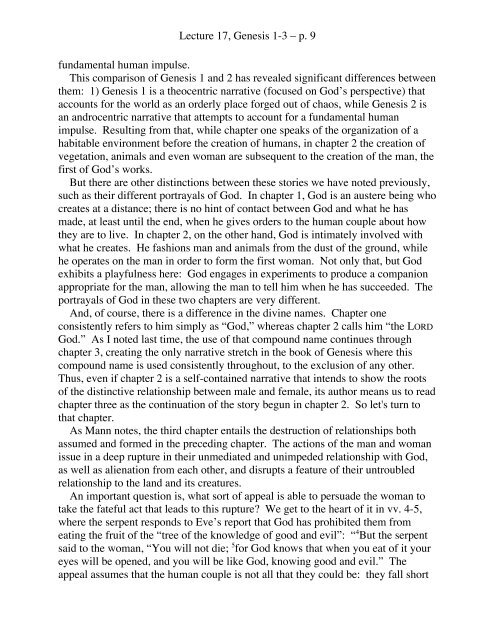Lecture 17: The Primeval Narrative (Genesis 1-3) History-telling in ...
Lecture 17: The Primeval Narrative (Genesis 1-3) History-telling in ...
Lecture 17: The Primeval Narrative (Genesis 1-3) History-telling in ...
Create successful ePaper yourself
Turn your PDF publications into a flip-book with our unique Google optimized e-Paper software.
<strong>Lecture</strong> <strong>17</strong>, <strong>Genesis</strong> 1-3 – p. 9<br />
fundamental human impulse.<br />
This comparison of <strong>Genesis</strong> 1 and 2 has revealed significant differences between<br />
them: 1) <strong>Genesis</strong> 1 is a theocentric narrative (focused on God’s perspective) that<br />
accounts for the world as an orderly place forged out of chaos, while <strong>Genesis</strong> 2 is<br />
an androcentric narrative that attempts to account for a fundamental human<br />
impulse. Result<strong>in</strong>g from that, while chapter one speaks of the organization of a<br />
habitable environment before the creation of humans, <strong>in</strong> chapter 2 the creation of<br />
vegetation, animals and even woman are subsequent to the creation of the man, the<br />
first of God’s works.<br />
But there are other dist<strong>in</strong>ctions between these stories we have noted previously,<br />
such as their different portrayals of God. In chapter 1, God is an austere be<strong>in</strong>g who<br />
creates at a distance; there is no h<strong>in</strong>t of contact between God and what he has<br />
made, at least until the end, when he gives orders to the human couple about how<br />
they are to live. In chapter 2, on the other hand, God is <strong>in</strong>timately <strong>in</strong>volved with<br />
what he creates. He fashions man and animals from the dust of the ground, while<br />
he operates on the man <strong>in</strong> order to form the first woman. Not only that, but God<br />
exhibits a playfulness here: God engages <strong>in</strong> experiments to produce a companion<br />
appropriate for the man, allow<strong>in</strong>g the man to tell him when he has succeeded. <strong>The</strong><br />
portrayals of God <strong>in</strong> these two chapters are very different.<br />
And, of course, there is a difference <strong>in</strong> the div<strong>in</strong>e names. Chapter one<br />
consistently refers to him simply as “God,” whereas chapter 2 calls him “the LORD<br />
God.” As I noted last time, the use of that compound name cont<strong>in</strong>ues through<br />
chapter 3, creat<strong>in</strong>g the only narrative stretch <strong>in</strong> the book of <strong>Genesis</strong> where this<br />
compound name is used consistently throughout, to the exclusion of any other.<br />
Thus, even if chapter 2 is a self-conta<strong>in</strong>ed narrative that <strong>in</strong>tends to show the roots<br />
of the dist<strong>in</strong>ctive relationship between male and female, its author means us to read<br />
chapter three as the cont<strong>in</strong>uation of the story begun <strong>in</strong> chapter 2. So let's turn to<br />
that chapter.<br />
As Mann notes, the third chapter entails the destruction of relationships both<br />
assumed and formed <strong>in</strong> the preced<strong>in</strong>g chapter. <strong>The</strong> actions of the man and woman<br />
issue <strong>in</strong> a deep rupture <strong>in</strong> their unmediated and unimpeded relationship with God,<br />
as well as alienation from each other, and disrupts a feature of their untroubled<br />
relationship to the land and its creatures.<br />
An important question is, what sort of appeal is able to persuade the woman to<br />
take the fateful act that leads to this rupture? We get to the heart of it <strong>in</strong> vv. 4-5,<br />
where the serpent responds to Eve’s report that God has prohibited them from<br />
eat<strong>in</strong>g the fruit of the “tree of the knowledge of good and evil”: “ 4 But the serpent<br />
said to the woman, “You will not die; 5 for God knows that when you eat of it your<br />
eyes will be opened, and you will be like God, know<strong>in</strong>g good and evil.” <strong>The</strong><br />
appeal assumes that the human couple is not all that they could be: they fall short



